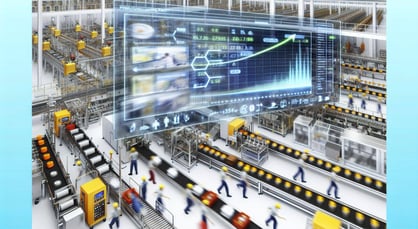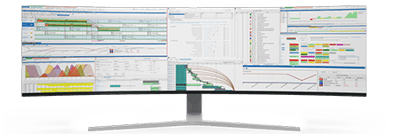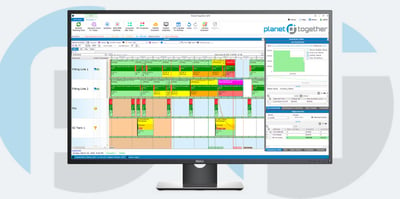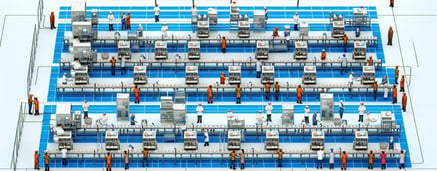Scheduling Optimization for High-Speed Manufacturing Processes
Meeting customer demands while minimizing production costs is a constant challenge in food and beverage. One key factor that plays a pivotal role in achieving these goals is scheduling optimization. Efficient scheduling ensures that your high-speed manufacturing processes run smoothly, reduce downtime, and maximize resource utilization.
In this blog, we will explore the critical role scheduling optimization plays in food and beverage manufacturing and how integrating PlanetTogether with leading ERP, SCM, and MES systems can revolutionize your production process.
The Importance of Scheduling Optimization
Scheduling optimization is the art and science of creating production schedules that balance various factors, such as resource availability, order priorities, lead times, and machine capacities. In high-speed manufacturing processes, where every second counts, efficient scheduling can make a substantial difference in profitability and customer satisfaction. Here are some key benefits of scheduling optimization:
Improved Efficiency: Efficient schedules ensure that production lines run at their maximum capacity, minimizing idle time and resource wastage.
Reduced Downtime: Proper scheduling minimizes the need for last-minute adjustments, reducing unexpected downtime and maintenance costs.
Enhanced Customer Satisfaction: Accurate and on-time deliveries of products are essential for retaining and attracting customers.
Cost Reduction: By optimizing schedules, you can minimize labor costs, energy consumption, and raw material wastage.
Better Resource Utilization: Scheduling optimization helps in the efficient allocation of resources, such as machines, labor, and inventory.

The Challenge of Scheduling in High-Speed Manufacturing
High-speed manufacturing processes pose unique challenges when it comes to scheduling. The fast-paced nature of production demands schedules that can adapt quickly to changing conditions. Factors such as machine breakdowns, rush orders, or unexpected material shortages can disrupt schedules in an instant.
Traditional manual scheduling methods often fall short in addressing these challenges. Spreadsheet-based systems are error-prone and lack the agility needed to respond to real-time changes effectively. This is where advanced scheduling software like PlanetTogether comes into play.
![]()

PlanetTogether: A Scheduling Powerhouse
PlanetTogether is a leading Advanced Planning and Scheduling (APS) software solution designed to tackle the most complex scheduling challenges. It empowers manufacturers to optimize their production schedules, improve resource utilization, and enhance overall operational efficiency. Here are some key features that make PlanetTogether a valuable asset for food and beverage manufacturers:
Advanced Algorithms: PlanetTogether employs advanced algorithms to create optimized schedules that factor in machine capacities, labor constraints, material availability, and more.
Real-time Data Integration: The software can seamlessly integrate with your ERP, SCM, and MES systems, providing real-time data updates and enabling quick response to changing conditions.
Scenario Analysis: PlanetTogether allows you to simulate "what-if" scenarios, helping you make informed decisions and evaluate the impact of schedule changes before implementation.
Constraint Management: The software can handle complex scheduling constraints, such as setup times, changeovers, and sequencing, to create efficient schedules.
Visual Scheduling: The intuitive visual interface provides a clear overview of production schedules, making it easy for planners to identify and address scheduling issues.

Integrating PlanetTogether with ERP, SCM, and MES Systems
To harness the full potential of PlanetTogether and achieve scheduling optimization in high-speed manufacturing processes, integration with your existing ERP, SCM, and MES systems is crucial. Here's how this integration can benefit your organization:
Real-time Data Sharing: Integration enables real-time data sharing between PlanetTogether and your other systems. This means that when an order is placed, modified, or completed in your ERP system, PlanetTogether immediately incorporates these changes into the production schedule.
Enhanced Visibility: With integrated systems, everyone in your organization has access to up-to-date scheduling information. This visibility allows for better decision-making and coordination across departments.
Reduced Manual Data Entry: Integration eliminates the need for manual data entry and reduces the risk of errors associated with duplicate data or data inconsistencies.
Streamlined Communication: Information flows seamlessly between systems, improving communication between production, inventory, and procurement teams.
Quick Response to Changes: In high-speed manufacturing, conditions can change rapidly. Integrated systems enable your organization to respond swiftly to disruptions or rush orders.
PlanetTogether Integration Options
PlanetTogether offers integration solutions with several leading ERP, SCM, and MES systems, including:
SAP: Integration with SAP ERP streamlines scheduling and ensures data consistency across the organization.
Oracle: PlanetTogether can integrate with Oracle E-Business Suite, facilitating accurate and timely scheduling.
Microsoft Dynamics: If your organization relies on Microsoft Dynamics, PlanetTogether can seamlessly integrate with it.
Kinaxis RapidResponse: For those using Kinaxis, integration with PlanetTogether ensures synchronized planning and scheduling.
Aveva: Integration with Aveva MES enhances your scheduling capabilities within the manufacturing execution system.
Choosing the Right Integration Strategy
The choice of integration strategy depends on your organization's specific needs and existing systems. You can opt for one of the following integration approaches:
Out-of-the-Box Integration: PlanetTogether offers pre-built connectors for many ERP, SCM, and MES systems, making integration relatively straightforward.
Custom Integration: If your systems have unique requirements or you use a less common ERP, SCM, or MES system, custom integration may be necessary. This approach allows for tailored solutions that address your specific needs.
Middleware Integration: Middleware solutions, such as enterprise service buses (ESBs), can serve as intermediaries between PlanetTogether and your existing systems, facilitating data exchange.
Cloud-Based Integration: Cloud-based integration platforms offer scalability and flexibility for connecting PlanetTogether with your systems, making it easier to adapt to changing requirements.
Hybrid Integration: In some cases, a hybrid approach combining multiple integration strategies may be the most effective solution for your organization.
Best Practices for Successful Integration
Integrating PlanetTogether with your ERP, SCM, and MES systems is a significant step toward achieving scheduling optimization in high-speed manufacturing. To ensure a successful integration, consider the following best practices:
Define Clear Objectives: Clearly define your integration goals, such as improving scheduling accuracy, reducing lead times, or increasing resource utilization.
Involve Stakeholders: Engage stakeholders from IT, production, planning, and procurement departments to ensure that integration aligns with their needs and expectations.
Plan for Data Mapping: Identify the data elements that need to be shared between systems and establish data mapping guidelines.
Test Thoroughly: Conduct extensive testing to validate data flow, identify potential issues, and fine-tune integration settings.
Provide Training: Ensure that your team is trained on the integrated systems to maximize its benefits.
Monitor and Optimize: Continuously monitor the integrated systems' performance and make adjustments as needed to adapt to changing business requirements.
Scheduling optimization is a crucial aspect of achieving efficiency and profitability in high-speed food and beverage manufacturing processes. PlanetTogether, with its advanced scheduling capabilities, can be a game-changer for your organization. When integrated seamlessly with your ERP, SCM, and MES systems, it becomes a powerful tool that enhances visibility, agility, and coordination across your entire manufacturing operation.
To embark on this journey toward scheduling excellence, assess your organization's needs, choose the right integration strategy, and follow best practices for successful implementation. By doing so, you can expect improved efficiency, reduced downtime, and increased customer satisfaction – all essential components for thriving in the competitive food and beverage industry.
Are you ready to take your manufacturing operations to the next level? Contact us today to learn more about how PlanetTogether can help you achieve your goals and drive success in your industry.
Topics: PlanetTogether Software, Scheduling Optimization, Integrating PlanetTogether, Streamlined Communication, Enhanced Visibility, Real-Time Data Sharing, Scalability and Flexibility, Quick Response to Changes, Food and Beverage Manufacturing, High-Speed Manufacturing Processes





















LEAVE A COMMENT